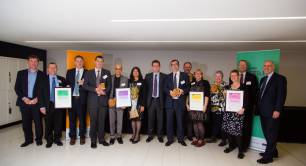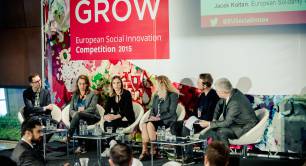Global giant seeks answers to global problems
The Siemens Stiftung foundation looks to heighten awareness of life changing, low tech innovation, although one previous winner thinks they could do more.
The ‘empowering people Award’ [sic] given out by the Siemens Stiftung foundation has shone a spotlight on some life changing innovations in the last few years. Inventors with solutions to global problems should get their entries in now for a chance to get their hands on some of the €200,000 prize money.
Siemens is a global corporate giant and the largest engineering company in Europe. It employs 362,000 people around the globe and had a reported global revenue of €71.9 billion in 2014. No small fish then.
The foundation was established with €390m of Siemens' profits in 2008. A number of philanthropic activities were going on inside the company and it was decided to separate those out from the main business with the establishing of the foundation.
Money is awarded to projects that are long term. The foundation does not simply hand out cash – money goes to sustainable enterprises. As an example, one of the previous winners, One Dollar Glasses (pictured above), trains local people in developing countries who then act as agents for the spectacles, going out into the field to test eyesight and manufacture the simple glasses on the spot.
Martin Aufmuth came up with the idea after realising that he could buy spectacles in his local 'one euro store' (the German equivalent of the UK’s 'pound shops'). Once he discovered that 150 million people worldwide needed spectacles to work and learn, he had his eureka moment.
Why is the Siemens Stiftung foundation giving these awards? Managing director Rolf Huber says there is not enough awareness of the kind of low-tech innovations out there in the market which are suitable for implementation in developing countries. “That’s the basic idea, to really look for solutions which are proven to be technically feasible but also could be implemented in a sustainable way by a small business model. To identify those solutions and put them onto a platform to showcase them, so that they are easily accessible for all organisations which are working in the developing field.”
The foundation promotes the winning ideas through its website and via social media. It also has a technical platform where solutions are showcased. Siemens Stiftung may also partner with one of the solutions if it fits with the business – Huber tells me that there will be an announcement in the next few weeks about such a partnership.
A previous British winner is Scottish plumber David Osborne. His Jompy water boiler is both ingenious and simple. Realising that many people in developing countries cook over open fires and need clean water, he came up with a simple solution combining the two activities that saves fuel.
The Jompy is a coil that sits over the fire but under any pot that might also be cooking food. Water is fed in and heated to more than 85°C, killing diseases and resulting in clean, hot water coming out of the coil the other end. It also means that fewer resources such as wood are burned in heating water and then food. "The average family would normally have to choose between clean water or a cooked meal,” he tells me. The Jompy means they no longer have to choose.
Osborne thinks the awards are “a fabulous thing” and agrees that the foundation's idea of shining a spotlight on potentially life changing innovations is a worthwhile pursuit. He tells me that one of the advantages he enjoyed personally after winning an award was meeting other, like minded individuals.
However, he feels that the Stiftung foundation could do even more above the €20,000 he received in prize money. Namely, the influence of Siemens as a big business that is taken seriously could have been just as useful. In his case, this could have meant an introduction to some of the agencies that reach people in need of clean water.
“Rather than having €20,000 and me using that for PR, marketing and flights, at the end of the day I still can’t get a meeting with Save The Children or whoever. If the foundation turned round and said ‘I’ve got you four meetings’ with several groups involving Oxfam, Red Cross and others, that would be worth more than the money.”
Despite this, he gratefully acknowledges the support that came alongside the money in the shape of workshops Siemens Stiftung provided advising how to seek funding and apply to governments for money. Any suspicion that the corporate is only after good PR is also firmly batted away. “I’ve been to some awards and it’s all about that company feeling good about themselves. Siemens are more involved than that. They do care.”
Winning the award definitely opened up collaboration opportunities for Osborne. He tells me the story of working with the United Nations Development Programme (UNDP) in Papua New Guinea. Water containers supplied by the UNDP were collecting rain water from rooves that were full of bugs and open to the air – the Jompys are now keeping that water clean.
A new batch of innovative, sustainable ideas that will help people in developing countries is now being sought. For information on entering the 2015 Siemens Stiftung 'empowering people. Award 2015' click here.



